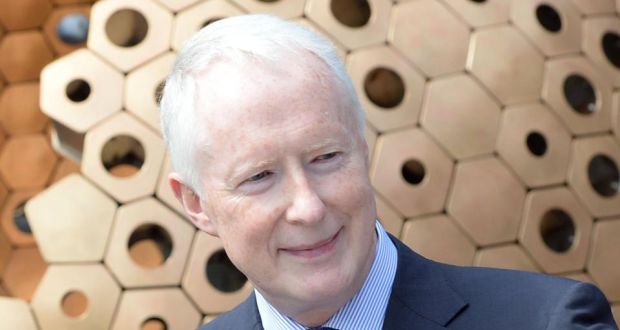Greg Daly talks to Trócaire’s Eamonn Meehan about his work leading the Irish Church’s overseas aid agency
“The whole concept of charity, and Catholic social teaching, is about love,” says Trócaire’s Executive Director Eamonn Meehan, “That’s what drives us.”
Originally from Clare, Eamonn went to school in Ennis before training as a primary school teacher in Limerick’s Mary Immaculate College, after which he spent four years teaching in Clane, Co. Kildare. During that period he was a frequent visitor to friends at the St Patrick’s Missionary Society in Kiltegan, Co. Wicklow, eventually spending two years teaching English in a secondary school run by them in northern Kenya, where he saw first-hand the kind of pastoral, development and humanitarian work the Kiltegans were doing alongside the Medical Missionaries of Mary.
“I learned a lot, and I felt that here was something I wanted to do with my life in terms of working for vulnerable people, who were clearly less well off than we were ourselves at home in Ireland,” he says.
Wars
Once back in Ireland he did a master’s degree and taught again briefly, before getting a job with APSO, the state Agency for Personal Service Overseas, in charge of the regional programme for southern Africa. Over four years there, between 1987 and 1991, he learned a lot about the region at a time when there were wars in Mozambique and Angola, while South Africa – which was attempting to destabilise Zimbabwe – was in the final stages of its apartheid era.
“I was in Harare the day Mandela was released, and I remember the intense joy and celebrations there,” he says, describing how he had known such prominent opponents of apartheid as Durban’s Archbishop Denis Hurley and the Irish Dominican Sr Margaret Kelly.
On returning to Ireland, Eamonn applied to become Trócaire’s new programme officer for South Africa, his four years in the role, expanding his understanding of good development and how best to support people and communities faced with “the gravest injustice because of their race and their colour”.
Since then, he says, he has served as Trócaire’s head of international programmes and head of Ireland functions, which includes fundraising, schools work, and education, and in 2013 took on his new role as executive director where he heads the organisation as it faces challenges in a changing world.
In recent years, the biggest challenges have entailed responding effectively to humanitarian disasters caused by war, with Syria being a perfect example of that – although staff are sent in and local Church organisations are funded there, it is very difficult and dangerous to operate there.
Another challenge, he says, is that Ireland is now a highly competitive environment for charities, with many other charities being highly professional in their fundraising. Admitting that it helps to be an agency of the bishops’ conference, with the Lenten campaign being a mainstay of Trócaire’s funding, he nonetheless says it’s important to keep getting the message out, explaining what Trócaire does and why it does it.
“The world is changing and changing rapidly – there is a lot of questioning about what is development and how to best practice it and where we should be putting our money,” he says, maintaining that Trócaire has a real advantage in terms of responding to these questions. He points to its roots in the Gospels and in Catholic social teaching, with its emphasis on the common good and the human dignity of each and every individual, he says.
When Ireland’s bishops founded Trócaire in 1973, he says, they were adamant that we have responsibilities towards the poorest people on the planet, not simply out of charity, but out of justice.
“We feel our mission is to work with those, to support the local Church, to support local organisations that are working to respond to people’s basic needs, but also to look fundamentally at the causes of poverty and equality and respond to those.”
The emphasis on local organisations and the local Church is key to Trócaire’s identity, he says. “Trócaire’s a partnership organisation, which means we provide grant assistance to local organisations, local diocesan development offices, local Caritas organisations, Justice and Peace, and others,” he says, noting that this shows that “it’s not a colonial or neo-colonial enterprise, it’s not white Irish people coming to show others how to do things properly”.
Local people
“It is a partnership,” he continues, “It’s about supporting local people to do the things they regard as important. What we do is try to build the capacity of these organisations, so they can better do what they want to do. They know their own context and the culture, and we believe firmly that they know best what is right for local communities and local societies. We’re there to help, and to give them a voice with our government or with the European Union or internationally.”
Admitting that the fact that Trócaire brings money to the table might be seen as skewing relationships with partners, he is adamant that “it is not about the money”and that Trócaire has a lot to learn from its partners.
Those who work in Trócaire, he concludes, find it an invaluable way of expressing their Faith, adding that “It offers huge opportunities for young people.” Commenting on how the advertising of positions always meet with huge interest, he says. “It’s a great way for young people to learn about their Church and Faith, and to find a very practical way of working that out.”


 Greg Daly
Greg Daly Trócaire Executive Director Eamonn Meehan
Trócaire Executive Director Eamonn Meehan